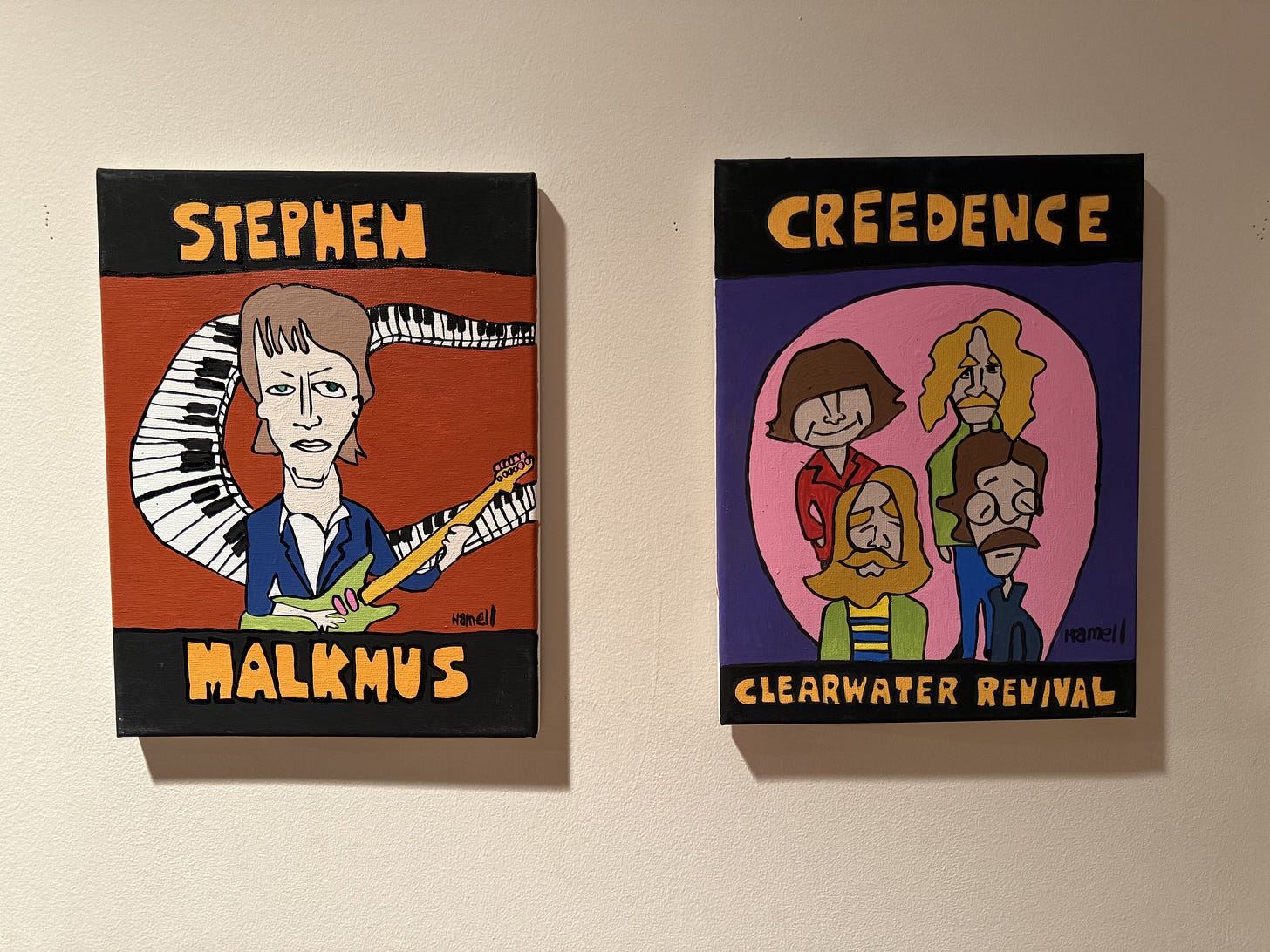The South Takes What the North Delivers: Pavement's 'Crooked Rain, Crooked Rain' and Other Tales
Is it a crisis or a boring change?
Depending on your head space, you might look at your CD collection on any given night, and see the title Crooked Rain, Crooked Rain on the shelf and your mind might register: CCR. We Commander Cody fans speak often of cosmic coincidences, but obviously this is more than that. Crooked Rain, Crooked Rain is the great CCR record of the ‘90s, just as the Black Crowes’ The Southern Harmony and Musical Companion is the killer disc that we might’ve gotten from a zombie Humble Pie.

A few years ago, over at Pitchfork, we tried ranking the Best Albums of the 90’s — no easy task given the stakes. In that somber moment of self-reflection, I wrote this about Crooked Rain, Crooked Rain — a judicious #29 on the list.
Pavement’s decision to graft a shadow history of ’60s and ’70s California folk-rock and psychedelia onto the abrasive, Fall-inspired noise of their previous sound made total sense once the end product was rendered. But in some ways this obscures what a truly strange and wondrous inspiration it was in the first place. Crooked Rain, Crooked Rain’s 12 tracks are alternately sparkling and insinuating, mournful and ominous and finally cathartic, variously evoking the desert swoon of the Flying Burrito Brothers, the swaggering two-guitar overdrive of Buffalo Springfield, and the eerie chill of jazz pioneer Dave Brubeck. When Stephen Malkmus sings, “Good night to the rock’n’roll era” over the closing tribute to famed concert promoter Bill Graham, “Fillmore Jive,” it’s part funeral and part exorcism: a final postscript for the sandcastle paradise of ’60s utopianism. Freedom’s just another word when everything is lost.
A good and rousing speech! To talk about Crooked Rain, Crooked Rain properly, you must be prepared to discuss California at some length. I lived there for a while, in San Francisco, in my 20s and while I will never claim I learned anything crucial, I was certainly never the same.
There are many notable songs about Los Angeles and San Francisco, too many to mention, some wonderful, some aggressively officious, some with confusingly overlapping currents that make precise assessments of their relative merits blur around the edges. (Los Angeles: “L.A. Woman,” “Under the Bridge.” San Francisco: “Lights,” “We Built This City.”) California music tends to fixate on its formidable metropolises, but the state is so huge. The very best songs are usually off the grid.
With apologies to “Stuck in the Middle” and “Stuck Inside of Mobile,” “Lodi” is the best song in the rock tradition regarding the topic of being stuck: geographically, professionally, emotionally, spiritually. Three minutes and twelve seconds lurking near the top of side two of their Green River LP, it moves along with the accustomed, agreeable, long-established Creedence groove, but the sense of resignation in John Fogerty’s voice is hard to miss in one who has labored so long for such paltry rewards.
“Ran out of time and money/
Looks like they took my friends/
Oh Lord, I'm stuck in Lodi again”
Stockton is a twenty-minute drive from “Lodi.” Pavement is a “Lodi” band. So begins their first transcendent song “Here:” “I was dressed for success/ But success it never comes.” An anti-mantra, maybe.
When I lived in California, I was admittedly confused. It’s a very easy place to get foggy-headed about things, if you're temperamentally inclined, as I am. “Ran out of time and money/ Looks like they took my friends.” Not to brag, but that was pretty much my experience in California. Sure, there were highlights: I visited Alcatraz — an impressive display. And sure, I thought about Nixon. Nixon from Whittier — five hours down the road from me, but everything is five hours down the road in California.
California has always had a strict cultural hierarchy — the glamorous and the not glamorous — and it’s weird how those atavistic truths hold. Although Nixon was well-enough liked — evidenced by one close loss and one landslide presidential election — he never felt well-liked. This affected everything. His insanity with the Watergate plan and the more advanced insanity of the cover up. He was very paranoid. Cowed by the Kennedy money he faced in the 1960 election — the glamor and spectacle of competing with the upper crust of the Eastern elite, as a California cowtown nobody, he spectacularly imploded. The first televised presidential debate. The humiliation of his stilted language and pancake makeup. Got struck by the first volley.
“Silence Kid” sounds exactly like live Hot Tuna in 1969 tuning up to play their first song of a free concert, and then really delivering the goods and breaking into a fruitful jam and a soaring chorus. Coulda called it “Hesitation Blues.” Coulda called the whole band that. “Why am I so shy?” Lou Reed added to his other weird babble on “Lisa Says” recorded live in 1969 down in Dallas, where they always love the president.
Has any lyric to any song ever limned the dilemma of hair like “Cut Your Hair?” Kinda like the Ventures covering the Replacements’ ”Lovelines” — stop no — not like that at all. Stop to think: did you know David Crosby once wrote the weirdo lament: “Almost Cut My Hair?” This is kind of a political song, but it’s a little bit of straight-reportage to:
“Almost cut my hair/
It happened just the other day/
It was gettin’ kinda’ long/
I could've said it was in my way”
What Crosby is saying from the leading front of the resistance is that it’s genuinely difficult to see through long hair, when it crosses your eyes, or particularly if you are perspiring. It is strange the properties that hair definitionally holds that I guess gives it a certain sway over rock ‘n’ roll: greaser Eddy Cochran, the Beatle moptops, Zeppelin’s untamed manes, the unruliness of Bowie, Right Said Fred, back again. Under pressure like that, Crosby couldn’t cut his hair under anything less than pressing circumstances! And I agree! But not Pavement as luck would hold.
Of course, the record, Crooked Rain, Crooked Rain is really about Bill Graham, in the kind of wonderful, poignant way that every rock record between about 1967 to Crooked Rain was, in some way, about Bill Graham. “Fillmore Jive.” Of course — a great title. A great ending. Story goes that Graham loved CCR, and hated the Dead. CCR, rigorous about their business, serious about their job, always on their mark. The Dead in their indulgences: “See those rockers in their long curly locks.” He was, after all, a businessman, a firestarter, a German Jew born Wulf Wolodia Grajonca — the sundry gyrations of the red-diaper baby scene in the Bay Area could simply not have meant less to them. I know, I know — but would we not take Nixon now, were he on offer?
CRCR, the final spasm — “I need to sleep” nightmare train — long curly locks, jazz buffs, skinny arms. The loosening of the bolts. California here I come. The last westward destination of the last of the midnight settlers.
If I could settle down, then I would settle down.



If I remember correctly the day Bill Graham died Thurston and (the backbeat band maybe) played Rip Off by T Rex
Lodi, California makes so much more sense, but I always thought he was in New Jersey 3,600 miles from home.